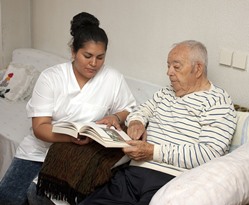How to Select the Right LPN Program near Halifax North Carolina
 There are basically two scholastic credentials offered that provide education to become an LPN near Halifax NC. The one that can be finished in the shortest amount of time, commonly about one year, is the certificate or diploma program. The second alternative is to attain a Practical Nursing Associate Degree. These LPN programs are more comprehensive in nature than the diploma option and normally require 2 years to complete. The advantage of Associate Degrees, along with supplying a higher credential and more extensive training, are that they furnish more transferable credit toward a Bachelor’s Degree in nursing. Regardless of the kind of credential you seek, it should be state approved and accredited by the National League for Nursing Accrediting Commission (NLNAC) or some other national accrediting organization. The NLNAC guarantees that the core curriculum properly prepares students to become Practical Nurses, and that the majority of graduates pass the 50 state required NCLEX-PN licensing exam.
There are basically two scholastic credentials offered that provide education to become an LPN near Halifax NC. The one that can be finished in the shortest amount of time, commonly about one year, is the certificate or diploma program. The second alternative is to attain a Practical Nursing Associate Degree. These LPN programs are more comprehensive in nature than the diploma option and normally require 2 years to complete. The advantage of Associate Degrees, along with supplying a higher credential and more extensive training, are that they furnish more transferable credit toward a Bachelor’s Degree in nursing. Regardless of the kind of credential you seek, it should be state approved and accredited by the National League for Nursing Accrediting Commission (NLNAC) or some other national accrediting organization. The NLNAC guarantees that the core curriculum properly prepares students to become Practical Nurses, and that the majority of graduates pass the 50 state required NCLEX-PN licensing exam.
What is an LPN?
 Licensed Practical Nurses have numerous duties that they complete in the Halifax NC medical facilities where they are employed. As their titles imply, they are mandated to be licensed in all states, including North Carolina. While they may be accountable for managing Certified Nursing Assistants (CNA), they themselves generally work under the guidance of either an RN or a doctor. The medical facilities where they work are numerous and assorted, for instance hospitals, medical clinics, schools, and long-term care facilities. Virtually any place that you can find patients seeking medical assistance is their dominion. Every state not only regulates their licensing, but also what work activities an LPN can and can’t perform. So based on the state, their everyday job functions may include:
Licensed Practical Nurses have numerous duties that they complete in the Halifax NC medical facilities where they are employed. As their titles imply, they are mandated to be licensed in all states, including North Carolina. While they may be accountable for managing Certified Nursing Assistants (CNA), they themselves generally work under the guidance of either an RN or a doctor. The medical facilities where they work are numerous and assorted, for instance hospitals, medical clinics, schools, and long-term care facilities. Virtually any place that you can find patients seeking medical assistance is their dominion. Every state not only regulates their licensing, but also what work activities an LPN can and can’t perform. So based on the state, their everyday job functions may include:
- Checking vital signs
- Giving medicines
- Starting IV drips
- Observing patients
- Taking blood or urine samples
- Managing patient records
- Supporting doctors or Registered nurses with procedures
Along with their job duties being controlled by each state, the medical facilities or other Halifax NC healthcare providers where LPNs work can further limit their job roles within those parameters. Additionally, they can practice in different specialties of nursing, including long-term care, critical care, oncology and cardiology.
Online LPN Programs
 Enrolling in LPN schools online is emerging as a more preferred way to get training and earn a nursing certificate or degree in Halifax NC. Many schools will require attendance on campus for a component of the training, and virtually all programs require a specific number of clinical rotation hours performed in a local healthcare center. But since the rest of the training can be accessed online, this method may be a more accommodating solution to finding the time to attend college for many students. Regarding tuition, some online degree programs are cheaper than other on campus options. Even additional expenses such as for commuting and study materials can be lessened, helping to make education more easily affordable. And many online programs are accredited by U.S. Department of Education recognized organizations. Therefore if your work and household responsibilities have left you with very little time to pursue your academic goals, maybe an online LPN program will make it easier to fit a degree into your busy schedule.
Enrolling in LPN schools online is emerging as a more preferred way to get training and earn a nursing certificate or degree in Halifax NC. Many schools will require attendance on campus for a component of the training, and virtually all programs require a specific number of clinical rotation hours performed in a local healthcare center. But since the rest of the training can be accessed online, this method may be a more accommodating solution to finding the time to attend college for many students. Regarding tuition, some online degree programs are cheaper than other on campus options. Even additional expenses such as for commuting and study materials can be lessened, helping to make education more easily affordable. And many online programs are accredited by U.S. Department of Education recognized organizations. Therefore if your work and household responsibilities have left you with very little time to pursue your academic goals, maybe an online LPN program will make it easier to fit a degree into your busy schedule.
LPN Salary
According to the Bureau of Labor Statistics, the median annual wage for Licensed Practical Nurses (LPN) was $45,030 in May 2017. The median wage is the wage at which half the workers in an occupation earned more than that amount and half earned less. The lowest 10 percent earned less than $32,970, and the highest 10 percent earned more than $61,030. Most licensed practical nurses near Halifax NC work full time, although about 1 in 5 worked part time in 2016. Many work nights, weekends, and holidays, because medical care takes place at all hours. They may be required to work shifts of longer than 8 hours. Employment of LPNs is projected to grow 12 percent from 2016 to 2026. Job prospects should be favorable for LPNs who are willing to work in rural and medically under served areas.
Things to Ask LPN Programs
 Once you have decided on obtaining your LPN certificate, as well as if you will attend classes on campus or online, you can utilize the following guidelines to start narrowing down your options. As you probably realize, there are many nursing schools and colleges near Halifax NC as well as within North Carolina and throughout the United States. So it is essential to reduce the number of schools to choose from to ensure that you will have a workable list. As we already mentioned, the location of the school as well as the expense of tuition are probably going to be the initial two factors that you will consider. But as we also stressed, they should not be your sole qualifiers. So prior to making your ultimate choice, use the following questions to see how your pick measures up to the other programs.
Once you have decided on obtaining your LPN certificate, as well as if you will attend classes on campus or online, you can utilize the following guidelines to start narrowing down your options. As you probably realize, there are many nursing schools and colleges near Halifax NC as well as within North Carolina and throughout the United States. So it is essential to reduce the number of schools to choose from to ensure that you will have a workable list. As we already mentioned, the location of the school as well as the expense of tuition are probably going to be the initial two factors that you will consider. But as we also stressed, they should not be your sole qualifiers. So prior to making your ultimate choice, use the following questions to see how your pick measures up to the other programs.
- Accreditation. It’s a good idea to make sure that the certificate program in addition to the school are accredited by a U.S. Department of Education recognized accrediting organization. Aside from helping ensure that you obtain an excellent education, it may assist in obtaining financial aid or student loans, which are frequently not offered for non-accredited schools near Halifax NC.
- Licensing Preparation. Licensing requirements for LPNs vary from state to state. In all states, a passing score is needed on the National Council Licensure Examination (NCLEX-PN) together with graduation from an accredited school. Many states require a specific number of clinical hours be completed, as well as the passing of additional tests. It’s important that the school you are attending not only provides an excellent education, but also readies you to meet the minimum licensing standards for North Carolina or the state where you will be practicing.
- Reputation. Visit internet rating services to see what the evaluations are for all of the LPN schools you are considering. Ask the accrediting agencies for their reviews also. In addition, get in touch with the North Carolina school licensing authority to determine if there are any complaints or compliance issues. Finally, you can contact some nearby Halifax NC healthcare organizations you’re interested in working for after graduation and ask what their opinions are of the schools as well.
- Graduation and Job Placement Rates. Find out from the LPN schools you are looking at what their graduation rates are as well as how long on average it takes students to finish their programs. A low graduation rate may be an indication that students were displeased with the program and dropped out. It’s also important that the schools have high job placement rates. A high rate will not only substantiate that the school has a good reputation within the Halifax NC medical community, but that it also has the network of contacts to assist students attain a position.
- Internship Programs. The best way to acquire experience as a Licensed Practical Nurse is to work in a clinical environment. Virtually all nursing degree programs require a specified number of clinical hours be completed. Various states have minimum clinical hour prerequisites for licensing too. Check if the schools have associations with nearby Halifax NC community hospitals, clinics or labs and help with the positioning of students in internships.
Enrolling in an LPN Program near Halifax NC?
If you are considering enrolling in and attending an LPN school near Halifax NC, you may find the following information both interesting and useful when making your final decision.
Halifax County, North Carolina
Halifax County is located in North Carolina's Coastal Plain region. The geography and history of the county were shaped by the Roanoke River, which forms its northern boundary. According to Preservation North Carolina, “Halifax County, designated in 1759, is one of the oldest counties in North Carolina with a rich history dating back to the earliest days of European settlement of North America. Over the years, Halifax County has provided North Carolina with more leaders – governors, congressmen, generals – than any other county in the state.”
Originally the area was home to Tuscarora Indians and then it was settled in the early 18th century by English colonists migrating south from Virginia and also from New Jersey. The town of Halifax developed along the banks of the Roanoke River and established itself as the trading center for goods passing from settlement to settlement. The Roanoke River played a major role in the county’s development, so much so that Halifax County was even considered as a potential capital of North Carolina. It remained a prosperous county until the railroads usurped the river as the major form of transportation. After Halifax County separated from Edgecombe County, the town of Halifax became the county seat (Enfield was the original county seat when Halifax was part of Edgecombe County). All territory within the boundaries of Edgecombe County north of Fishing Creek and Rainbow Banks on the Roanoke River (approximately 711 square miles) was officially designated as Halifax County on January 1, 1759. The current Halifax County towns include Enfield, Hobgood, Littleton, Roanoke Rapids, Scotland Neck and Weldon.
Besides having 40 sites on the National Register of Historic Places, Halilfax County is also historically significant because of two events preceding the American Revolution. John Lord Carteret, the second Earl Granville, inherited a one-eighth share of Carolina territory originally granted to Sir George Carteret by the British Crown. The second Earl Granville administered the district (an area between the present Virginia-North Carolina border and a line about 65 miles south) from across the Atlantic, but there was little oversight and the land agents he put in charge of granting land, collecting rent and surveying for settlers – Edward Moseley, Francis Corbin and Thomas Child – were often accused of malfeasance by settlers and landowners.
Choose the Right LPN School near Halifax NC
 Choosing the ideal Licensed Practical Nurse program is arguably the most crucial phase to starting a new career in the health care field. There are a number of variables that you need to take into account when selecting a nursing school. These variables will be prioritized differently depending on your current career goals, obligations, and economic situation. As we have emphasized within this content, it is essential that you pick an LPN school and a certificate or degree program that are each accredited and have outstanding reputations within the health care community. You originally decided to visit this website because of an interest in How To Become an LPN. However, by using our checklist of qualifying questions, you will be able to create a short list of schools to select from so that you can make your ultimate selection. And with the proper degree and training, combined with your hard work and drive to succeed, you can become a Licensed Practical Nurse in Halifax NC.
Choosing the ideal Licensed Practical Nurse program is arguably the most crucial phase to starting a new career in the health care field. There are a number of variables that you need to take into account when selecting a nursing school. These variables will be prioritized differently depending on your current career goals, obligations, and economic situation. As we have emphasized within this content, it is essential that you pick an LPN school and a certificate or degree program that are each accredited and have outstanding reputations within the health care community. You originally decided to visit this website because of an interest in How To Become an LPN. However, by using our checklist of qualifying questions, you will be able to create a short list of schools to select from so that you can make your ultimate selection. And with the proper degree and training, combined with your hard work and drive to succeed, you can become a Licensed Practical Nurse in Halifax NC.
More Practical Locations in North Carolina
